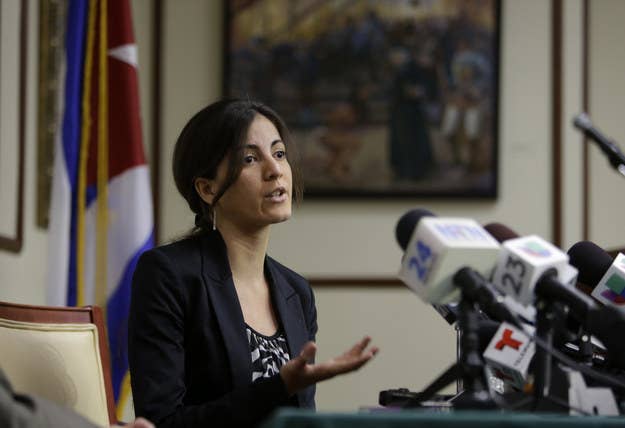
The daughter of a well-known Cuban dissident who died under mysterious circumstances two years ago says that while she is happy that imprisoned American Alan Gross was released, she believes that the Cuban people "are being ignored" in the new shift in U.S. policy towards Cuba and that the new policy ignores the abuses of Cuba's ally Venezuela.
"The government of Obama is in some way rewarding the Cuban government for the release of the hostage," said Rosa María Payá, the daughter of Oswaldo Payá. Oswaldo Payá was a Cuban activist who opposed the Castro regime and won the European Parliament's Sakharov Prize for his petition calling for free multiparty elections in Cuba. "There is something paradoxical about this. The Obama administration has right now on [Obama's] desk the deal passed in the Congress asking for sanctions against the Venezuelan government. And the Venezuelan government is very influenced by the Cuban government."
Payá, 25, is a Cuban national who lives in Miami. Her father and an associate named Harold Cepero died in a car crash in 2012 that international observers have deemed suspicious, and Payá herself thinks that the Cuban government had a hand in orchestrating. The Spanish man whom the Cuban police arrested for the crime said that he had been forced to confess under duress. Payá has repeatedly questioned the official narrative of her father's death.
The Obama administration on Wednesday announced the release of Alan Gross, who had been in a Cuban jail for the last five years. The administration also announced a sweeping change in policy towards Cuba, and will lift some travel restrictions from the U.S. as well as open an embassy and appoint an ambassador. In Payá's view, the U.S. has not done enough to explain how these changes will help the Cuban people.
"Is the government of the United States saying that these steps are going to help in some way?" Payá asked. "They should tell in which way they are going to help."
"The Cuban people are being ignored in this secret conversation, in this secret agreement that we learned today," she said. "The reality of my country is there is just one party with all the control and with the state security controlling the whole society. If this doesn't change, there's no real change in Cuba. Not even with access to Internet. Not even when Cuban people can travel more than two years ago. Not even that is a sign of the end of the totalitarianism in my country."
"If the governments of the world are going to help us, I'm asking that the governments of the world, including the United States government, be coherent in their principles of democracy," Payá said.
Asked how she personally feels about the policy change given her family's story, Payá said, "My emotions are meaningless for the American government."
Payá called for the U.S. to "take into account the demands of the citizenship, and the citizenship is demanding real democratic elections."
"If they are talking with the Cuban government, then they should ask the Cuban government what happened with the autopsy report of the death of my father and Harold Cepero, why the Cuban government doesn't allow a proper investigation into the attack against Harold Cepero and Oswaldo Payá," Payá said.
